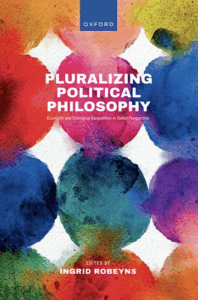by Chris Bertram on May 12, 2025
A few weeks ago the historian Perry Anderson published an essay “Regime Change in the West?” in the London Review of Books. Like many of Anderson’s essays this is a wide-ranging splurge full of bon mots and *apercus” delivered from some quasi-Olympian height. My attention was caught, though, by the following couple of sentences which both expressed a widely-held belief, even a cliché, but one which I knew to be false despite the lazy “of course” which Anderson interjects:
Historically too, of course, the US is an immigrant society, as no European country has ever been [emphasis added]. That means there is a tradition of selective welcome and solidarity for newcomers that doesn’t exist at anything like the same emotional pitch in Europe.
The reason I knew this to be false is that, unlike Anderson, I had taken the trouble in my own (non-historical) work on immigration to read the work of France’s foremost historian of the phenomenon, Gérard Noiriel in his now-classic work, Le creuset francais: histoire de l’immigration (XIXe-XXe siècle) (Seuil, 1988). In his opening chapter “The dismissal of memory”, Noiriel addresses both the facts and the myth, pointing out that while in the US immigration is understood as an “internal” part of the constitutive history of the nation, in France it has been treated as something episodic and external. But when you look at the facts, immigration has played as much of a role, and perhaps more, in French society as American.
[click to continue…]
by Eric Schliesser on May 12, 2025
More than a month ago, I agreed to an offer to be a visiting scholar at a private US university next year. This was no simple matter because of obligations to my own family and (somewhat more unexpectedly) my department. I have made no public announcement on it yet not because I am especially personally worried by the Trump administration’s policies toward higher education, but rather because I am still completing (electronic) paperwork and background-checks from the host institution. (It would be bad luck to announce before the process is fully completed.)
Now, by academic standards, I have moved jobs (not always willingly) quite frequently and I have also accumulated quite a bit of visiting positions. I have worked in three different countries and have held all kinds of academic jobs during the last quarter century. So, I am familiar with the great variability in the process by which the (electronic) paperwork for an appointment can be completed. When it comes to paperwork before the appointment-process is completed nothing will ever beat my experience moving to Flanders back in 2009. But Stateside, I had a rule of thumb that wealthy private institutions are relatively unencumbered by paperwork relative to the state institutions in order to ‘enter’ the system. I have to abandon this maxim.
I have no prior experience with this particular private university and N=1, I shouldn’t make any claims on the basis of it. But since university administrators in the same ecology tend to mimic each other, I would not be surprised if what I am experiencing is part of a wider trend of bureaucratic enshittification [a phrase I am stealing from my friend Tom Stoneham] at US private universities. (I won’t bore you with a graph of the rise of the number of administrators in US universities, but I am not the first to remark on the phenomenon.)
[click to continue…]
by Ingrid Robeyns on May 12, 2025
 Over the last years, I have edited a volume of papers on the question how to make analytical political philosophy more inclusive, with a particular focus on the debates on economic and ecological inequalities. The starting point was the observation that analytical political philosophy has for a long time been criticised for marginalizing (to a greater or lesser extent) certain voices and perspectives. Some of these voices and perspectives are internal critics of the liberal tradition – think of the feminist critiques or the critiques by care ethicists. But there have also been external perspectives that have been largely ignored, in particular perspectives from outside the western traditions. While there are well-developed specialist literatures on all of these traditions, they tend to be studied mainly by specialists. Non-western political philosophy and the internal critiques of liberal political philosophy are still too often overlooked in the field. My own estimation is that things are getting better – but very slowly, and hence I wanted to edit a book to make another small contribution to these collective effects to make political philosophy more pluralistic. [click to continue…]
Over the last years, I have edited a volume of papers on the question how to make analytical political philosophy more inclusive, with a particular focus on the debates on economic and ecological inequalities. The starting point was the observation that analytical political philosophy has for a long time been criticised for marginalizing (to a greater or lesser extent) certain voices and perspectives. Some of these voices and perspectives are internal critics of the liberal tradition – think of the feminist critiques or the critiques by care ethicists. But there have also been external perspectives that have been largely ignored, in particular perspectives from outside the western traditions. While there are well-developed specialist literatures on all of these traditions, they tend to be studied mainly by specialists. Non-western political philosophy and the internal critiques of liberal political philosophy are still too often overlooked in the field. My own estimation is that things are getting better – but very slowly, and hence I wanted to edit a book to make another small contribution to these collective effects to make political philosophy more pluralistic. [click to continue…]
